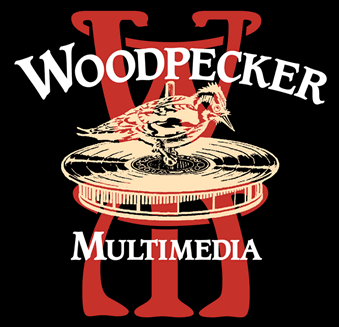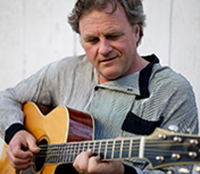|
|

These 9 songs and 10 instrumentals include 7 new releases plus
6 re-recordings and 6 reissues of earlier material. Collectively
they paint a musical portrait of a remarkable and complex artist,
who has a deep knowledge and respect for traditional music styles,
as well as a rare gift for song-writing and composing. Captured
here in pristine, natural, mostly-digital sound are many facets
of Reid's highly acclaimed 6-string, 12-string & slide guitar
styles, as well his innovative 6-string banjo, autoharp and mandolin
work. If you've already discovered Harvey Reid, this album should
provide you with plenty of new music­p; and it's an excellent
introduction to the man if you haven't...
CREDITS
Harvey Reid: Guitars, autoharp, mandolin, banjo, foot,
lead vocals
Rick Watson: Guitar, vocals, keyboard, piano ()
Brian Silber: Violin, viola on "Fyvio", "Coming of Winter",
"Johnny the Fisherman"
Anne Dodson: Harmony vocal on "All or Nothing"
Dan Crary: Lead guitar on "All or Nothing"
David Surette: Rhythm guitar on "Maggots /Flowers"
Arrangements, Production, Engineering, Mixing: Harvey Reid
Engineering Assistance: Jeff Landrock, Rick Watson
() Engineered by Ron Freeland at TRACK studios, Silver Spring, MD, 1983.
(§) Recorded at FISHTRAKS, Portsmouth NH; direct-to-digital except"All
or Nothing"
(·) Recorded at the artist's dining room table.
All other tracks recorded by Harvey Reid at The Cottage, near Bath, Maine.
Guitars: 1984 & 1990 Taylor rosewood dreadnought 6-string, early
1970's Metal body Dobro, 1987 Taylor maple jumbo 12-string, 1974 Mahogany Gallagher
on "California Blues"
Autoharp: 1973 Oscar Schmidt 21-chord Appalachian
Design and Graphics: Aphro-Graphics
Cover photo: Nancy Moulton
Special Thanks: Dawn Richardson, Rick Watson, Tom Daly, The Reidclan
(^) A Third Hand Capo was used on the guitar. Contact
http://www.partialcapo.com
(°) an additional track was overdubbed; all other tracks recorded live.
Most of this recording was recording direct-to-digital and
digitally mastered to CD. "Johnny the Fisherman" was
recorded and mixed to analog, and "All or Nothing",
"Streets of Fyvio", and "The Coming of Winter"
were recorded analog and then mixed and mastered to digital.
ABOUT THE SONGS...
All or Nothing * (H. Reid)(3:50) Written in Nashville
in 1980 about previous and subsequent relationships. Real life
is full of gray areas and rarely as simple as it ought to be in
Nashville songs. Two 6-strings, piano, 3 vocals. (§)()
Prelude: From the Minstrel's Dream *(H. Reid)(3:59) The
opening part of a monumental, 22 minute guitar piece from 1984.
Inspired by a Bach Brandenberg concerto. 6-string. (^)
Vigilante Man (W. Guthrie)(5:14) My all-metal guitar is
constructed such that even after I worked on it with a hammer,
it is hard to play without bumping the body with my right hand.
So I figured I'd just use the sound for percussion. Sure doesn't
hurt the guitar. Metal Dobro, vocal.
Off To Adventure (H. Reid)(3:22) Reminds me of a bagpipe
record my folks had when I was a kid that was recorded as the
band paraded by. It's eerie to think that my ancestors marched
off to war to stuff like this, and to think about all the centuries
of music before there were recordings. 12-string. (§)
Too Old to Ride (H. Reid)(3:38) Partly inspired by a retired
rodeo cowboy I met at the Cheyenne rodeo, this isn't supposed
to be sad. When you retire from active stuff you have to be a
spectator or tell stories. I hope I can play guitar right till
the end. 6-string.
Listen to the Mockingbird (Trad.)(2:33) This chestnut of
a tune, originally known as "Sweet Hallie" I believe,
features some old-fashioned, down-home style picking. 6-string.
Dying A Little (H. Reid)(4:23) Recorded the day it was
written; a complex and noir song about the complex task of living
in a world full of complex problems. 6-string (^)
Maggots in the Sheepside/Flowers of Edinburgh (Trad.)(2:23)
Two of my very favorite traditional fiddle tunes that date back
to my street music days. I learned the first from a street fiddler,
and I never met anybody since who either knew the tune or a better
name for it. The 2nd tune is well-known, for good reason. Mandolin,
guitar (§)
The Coming of Winter (H. Reid)(4:34) Written during a cold,
gray September day at The Cottage in Sept 1986, recorded moments
afterwards, never played since. Autoharp, violin.
Dreamer or Believer *(H. Reid)(3:10) A composite sketch
of many starving artist friends, written in Wisconsin in 1982,
cleverly put in the 3rd person, so no one suspects anything autobiographical.
There seems to be an unfair relationship between earning a decent
living and giving up your dreams. Two 6-strings & vocals.
(^)()(§)
The Bonnie Streets of Fyvio (Trad.)(2:07) Learned the melody
when I was a child. The words, that I probably should have sung,
tell of a tragic love affair between a Scottish girl and an Irish
soldier, I think­p; maybe vice versa. Autoharp, viola.
Restless Man* (H. Reid)(4:39) A freedom song, written posthumously
for Lowell George, recorded at my dining room table. Metal Dobro,
vocal. (·)
Cindy/Cripple Creek*(Trad.)(3:24) After 20 years of playing
traditional music I finally found a way to get mountain banjo
style sounds on solo guitar. Here I play it on a 6-string banjo,
tuned like a guitar. It's done on guitar on album #105. Same but
different. Hmm. (^) 6-string.
Waltz of the Waves (H. Reid)(4:02) Written for and about
the autoharp on my birthday , before coffee, if you can believe
it. It almost got words. I even started to write words for it.
Autoharp, keyboard. (§)()
Johnny the Fisherman (H. Reid)(3:21) Arrived while singing
in the car after a trip to Newfoundland, it's an old-time fiddle
tune with words. I can't sing it in the fiddle key, so it's in
2 parts. PART 1: 12-string , autoharp, 4 vocals; PART 2: 6-string,
violin, rhythm 6 string ()(^)()(°)
Cryin' Shame*(H. Reid)(4:05) Completed in Illinois in 1983,
it's almost a protest song, and a too-common story: "Man
gets drunk, shoots somebody, people wonder why..." Slide
guitar, vocal.
Chanoyu (H. Reid)(4:06) The banjo accidentally sounded
very un-occidental one night. Guitar tuning, though the piece
doesn't work on guitar at all. Chanoyu is the traditional Japanese
tea ceremony, that is purported to result in a state of serenity.
(^)(·) 6-string banjo.
California Blues (J. Rodgers)(2:47) A favorite old blues
tune, recorded spontaneously one night at The Cottage during a
very cold rain, which you can definitely hear. I felt like a hobo,
though I did have a roof and a fire and dry clothes. Reminded
me how much I like the mood Jimmie's songs evoke. Ragged but right.
6-string, vocal.
Danny Boy(Londonderry Air)(Trad.) (3:36) The other great
sing-along for drunks, and the only tune I ever heard my grandfather
play on his fiddle. 6-string (§)
* These cuts are re-recordings of selections that have
appeared on earlier albums.
Note: For CD freaks with headphones... With a few exceptions,
this music was recorded direct to digital, and there is no tape
noise. However, the thin walls of The Cottage did not always block
out the sound of the rather strong winds and the quite large waves
that at high tide were almost perilously close, and that sound
like hiss.I like to play music there and if I am playing well,I
just roll tape. If you hear things, it is the faint sound of the
world around me, gently covering that deadly digital silence in
a kind of analog and natural way. A way to make both analog and
digital fans happy, and much better than applause and coughing
and other "live" music noises. If you don't hear anything,
ignore this paragraph.
©2017
|
 H
H


